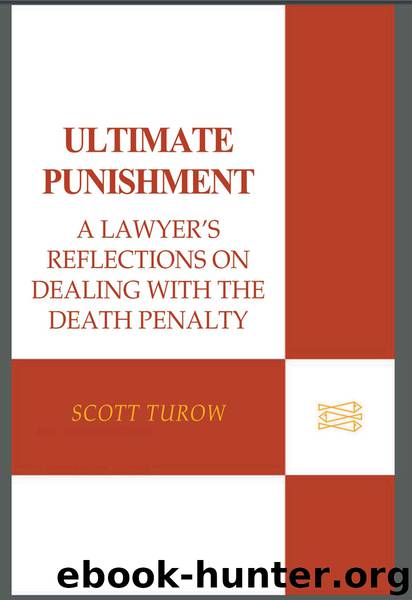Ultimate Punishment by Scott Turow

Author:Scott Turow
Language: eng
Format: epub
Publisher: Farrar, Straus and Giroux
Published: 2003-09-21T16:00:00+00:00
The reaction to Governor Ryan’s commutations in many regards defied predictions. A number of prosecutors, police officers, and survivors expressed outrage, but the public mood was far calmer than I, for one, had anticipated. In February, the St. Louis Post-Dispatch, a newspaper that serves much of southern Illinois, published poll results showing that Illinoisans were essentially evenly divided about whether the former Governor had done the right thing. Although 55 percent of the poll respondents still favored the death penalty, only 29 percent said they did so “strongly.” Even more impressive to me, given the skittishness I’d encountered among legislators, was this result: 65 percent of those polled said they were not likely to vote against a representative who favored abolition. Clearly, recent history had had a formative impact on opinion in my state.
Furthermore, the fact that roughly half the state agreed with their former Governor suggested that many in Illinois were sympathetic to the argument George Ryan had made in granting clemency, namely, that he had been left with little choice because the legislature had failed to enact any kind of reform. Rather than prompting the backlash I feared, George Ryan’s clemencies end up spurring the Illinois General Assembly, now in control of a Democratic majority, at last to make changes in Illinois’ death penalty system. In March 2003, a bill to abolish the death penalty actually received a favorable vote from a House committee before dying on the House floor. Yet the withering away of that effort occurred only as both the Illinois House and the Senate passed reform legislation, embodying a number of measures rooted in the Commission’s proposals. One bill mandated videotaping interrogations in homicide cases. A second, broader reform measure sponsored by Senators Cullerton and Dillard, among others, passed both houses in late May 2003 and embodied many more of the Commission’s most prominent recommendations. The reform bill called for hearings prior to the testimony of in-custody informants in capital cases, pilot programs to test the new lineup procedures the Commission favored, easier access for defendants to DNA testing after trial, and limiting felony-murder to inherently violent felonies. The measure also established procedures that would bar capital punishment if a court found the conviction was based solely on the uncorroborated testimony of an informant, accomplice, or eyewitness. It provided for decertification of law enforcement officers who willfully lie in homicide cases, and established procedures for determining whether a defendant is mentally retarded, presumptively barring capital punishment for those with an IQ of 75 or less.
Naturally, I would have liked even more, especially a state commission to approve death penalty cases, but prosecutors continue to insist that such a measure would be unconstitutional. I was disappointed that the bill still left Illinois with 21 death-eligibility factors. And factual review of guilty verdicts in death cases would remain limited under the new legislation. Trial judges may state their reasons for disagreeing with a death verdict, but not to overturn it; the law, though, would give the Supreme Court the power to set aside any death sentence it deemed “fundamentally unjust.
Download
This site does not store any files on its server. We only index and link to content provided by other sites. Please contact the content providers to delete copyright contents if any and email us, we'll remove relevant links or contents immediately.
| Anthropology | Archaeology |
| Philosophy | Politics & Government |
| Social Sciences | Sociology |
| Women's Studies |
Cecilia; Or, Memoirs of an Heiress — Volume 1 by Fanny Burney(32538)
Cecilia; Or, Memoirs of an Heiress — Volume 2 by Fanny Burney(31934)
Cecilia; Or, Memoirs of an Heiress — Volume 3 by Fanny Burney(31925)
The Great Music City by Andrea Baker(31911)
We're Going to Need More Wine by Gabrielle Union(19030)
All the Missing Girls by Megan Miranda(15924)
Pimp by Iceberg Slim(14476)
Bombshells: Glamour Girls of a Lifetime by Sullivan Steve(14046)
For the Love of Europe by Rick Steves(13862)
Talking to Strangers by Malcolm Gladwell(13340)
Norse Mythology by Gaiman Neil(13332)
Fifty Shades Freed by E L James(13228)
Mindhunter: Inside the FBI's Elite Serial Crime Unit by John E. Douglas & Mark Olshaker(9312)
Crazy Rich Asians by Kevin Kwan(9271)
The Lost Art of Listening by Michael P. Nichols(7486)
Enlightenment Now: The Case for Reason, Science, Humanism, and Progress by Steven Pinker(7303)
The Four Agreements by Don Miguel Ruiz(6739)
Bad Blood by John Carreyrou(6608)
Weapons of Math Destruction by Cathy O'Neil(6260)
